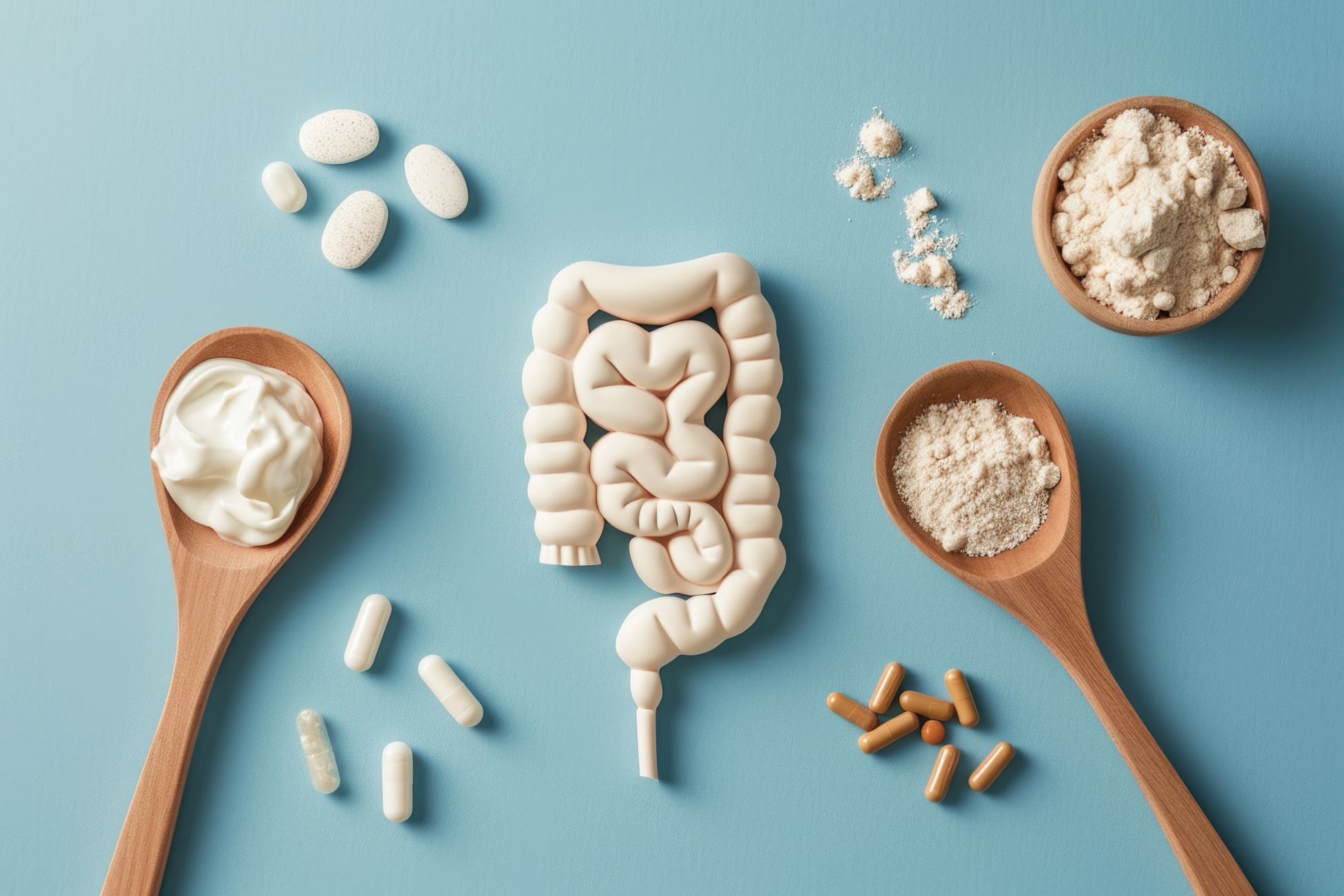Key Takeaways
-
Liposuction and gut probiotics: why you need them for faster healing Liposuction surgery stresses your body, gut microbiome and immune system, so supporting your gut health will improve your recovery.
-
That’s where probiotics — good bacteria — can come in handy to keep inflammation in check, rev up immunity, support nutrient absorption and rebalance your gut post-surgery, particularly if you need antibiotics.
-
By selecting the appropriate strains, adhering to dosage recommendations, and maintaining consistency, you can optimize their benefits during recovery.
-
Gut health affects skin quality — elasticity, scar healing, complexion — so probiotics and nutrient-dense foods matter for optimal post-surgery results.
-
Paired with prebiotic foods, an anti-inflammatory diet and lots of water, probiotics create the foundation for healing and healthy gut function.
-
Of course, always talk to medical professionals before introducing probiotics post-surgery, watch for side effects or interactions, and tailor your strategy to personal wellness requirements.
Liposuction and probiotics: gut health for faster healing means using good gut bacteria to help the body heal quicker after fat removal surgery. Probiotics reduce inflammation and strengthen your immune system — both of which can aid in wound closure.
A lot of patients utilize probiotics to maintain sterility in the gut following surgery, which can aid in comfort and reduce complication risk. The following sections provide specific information on why this works and what to experiment with.
The Surgical Impact
Liposuction places genuine strain on the body. Invasive steps, anesthesia, antibiotics can begin a cascade of changes in how the body heals and battles infection. Gut health is often overlooked but it matters for how fast and well you recover.
The impact of liposuction on stress includes the main effects of liposuction on stress, immune response, antibiotics, and gut microbiota.
|
Factor |
Effect During Surgery |
Impact on Gut Health |
|---|---|---|
|
Physiological Stress |
High stress response, tissue trauma |
Alters gut function, slows recovery |
|
Immune Response |
Triggered to fight infection and heal wounds |
Can disturb gut barrier, shift microbial balance |
|
Antibiotic Use |
Common to prevent infection |
Disrupts healthy bacteria, may cause dysbiosis |
|
Microbiota Changes |
Surgery, meds, and fasting can change balance |
Lowers diversity, raises risk of complications |
Body Stress
Liposuction is trauma governed. The body responds with a stress response impacting blood flow, hormones, and even gut motility. Stress hormones such as cortisol spike quickly, which can impede healing and disturb the digestive system.
A stressed body can alter the gut microbiome. Great bacteria might go down and bad ones up. This disequilibrium can cause increased swelling, sluggish bowels and increased risk of infection.
The connection between surgery stress and gut health is now well established in research. Other studies even indicate stress-induced gut alterations as an explanation for sluggish healing.
Easy ways to reduce stress serve to do a lot. Deep breathing, meditation, and good sleep can alleviate the body’s stress burden. When stress decreases, your gut functions and healing both improve.
Measure your mood and stress with journals or apps. Early signs of high stress—such as poor sleep or increased pain—should cause you to decelerate and call on your care team for assistance.
Immune Response
Liposuction ignites an immune response. Your immune system dispatches cells to heal and guard. This is necessary but can disrupt the gut barrier, allowing bacteria to seep through.
A robust immune system reduces such problems and accelerates recovery. Good gut bolsters immunity. Probiotics—beneficial bacteria you can consume—may assist in regulating this immune reaction.
Clinical evidence demonstrates that probiotics reduce the incidence of surgical site infections by approximately 37% as well as reducing other complications such as diarrhea. This impact is felt not only in plastic surgery but in larger scale surgeries as well.
Strengthen your immune system by consuming a balanced diet, following some daily movement, and taking quality rest. Incorporating probiotic foods or supplements could assist in maintaining this harmony in the gut and immune system.
Antibiotic Use
Antibiotics are commonly prescribed post-liposuction to prevent infection. Though necessary, they don’t simply kill off bad bugs but eradicate good gut bacteria. This loss can allow virulent germs to dominate.
Antibiotic gut imbalance can cause diarrhea, poor wound healing and increased infection risk. Certain antibiotics are more potent than others, but virtually all reduce gut diversity.
Probiotics can restore that balance. In research, they halved the rate of serious complications following surgery. Be cautious of gut shifts—such as bloating or loose stools—if you’re taking antibiotics.
Restoring the gut with probiotics or synbiotics (a combination of probiotics and prebiotics) is a scientifically backed measure for improved recovery. These can reduce the risk of complications up to 50%.
Never leave your care team in the dark if gut symptoms emerge.
How Probiotics Aid Recovery
Probiotics, on the other hand, are live bacteria that maintain gut health and balance. The body experiences trauma after liposuction and requires robust support to recover. Incorporating probiotics into your recovery plan can provide tangible benefits for inflammation, immunity, nutrient absorption, gut balance, and even mood.
1. Inflammation Control
How probiotics help post-lipo inflammation. Surgery disturbs the gut, resulting in immune shifts and inflammation. When probiotics are involved, they help control the body’s inflammatory process, so that healing is easier and less painful.
Gut health is very much connected to inflammation. A healthy gut can reduce the signals that promote swelling and tissue damage. Items such as yogurt, kefir, and fermented vegetables provide the gut with these beneficial bugs.
Introduction of probiotic-rich foods post-surgery reinforces a healthy inflammatory balance. As an example, kimchi or miso soup are easy options. It’s prudent to monitor swelling and inform a physician if it increases. That way recovery remains on course and the body repairs itself as it should.
2. Immunity Boost
Probiotics help the immune system function more effectively, reducing the risk of infections and other complications postoperative. The gut is a huge component of the immune system, and fortifying it helps avoid issues like surgical site infections.
The connection between gut health and immunity is established — when the gut is happy, the body is more effective at warding off germs. Whether through probiotic supplements or probiotic foods such as sauerkraut, loading up on these good bacteria can help boost immune defenses and reduce the risk of infections.
That’s significant since other research indicates probiotics may reduce post-op complications, particularly following intestinal surgeries. A probiotic-rich diet provides the immune system consistent reinforcement.
3. Nutrient Absorption
Probiotics assist the intestine in absorbing nutrients more effectively postoperatively. Recovery requires protein, vitamins and minerals, and a robust gut microbiome assists the body in utilizing these building blocks.
They digest food, allowing the intestines to extract more of the nutrients. A combination of tempeh, pickles and plain yogurt will help increase your probiotic levels. This allows your body to extract more nutrition from every meal throughout recovery.
4. Gut Balance
Why balancing the gut is important post-liposuction. Sometimes, surgery or medicines can throw stomach bacteria out of whack, leading to issues such as diarrhea or constipation. Probiotics aid in re-establishing this balance.
They crowd out bad bacteria and maintain gut lining integrity. Diet modifications, such as increasing fiber and reducing sugar intake, similarly promote a healthy gut. Monitor your gut health by observing any differences in your digestion or energy.
A balanced gut supports steady healing.
5. Mood Support
Your gut and your mood are intertwined, particularly in recovery. Probiotics can help keep postoperative stress and sadness at bay. Good gut bacteria produce substances that act as brain and mood boosters.
Stick to gut-friendly foods, such as plain yogurt or soft fruit, to maintain a positive attitude. Mindfulness, deep breathing, or light walks can facilitate recovery.
Probiotic Selection
Choosing the best probiotic post-liposuction can aid gut health and might even accelerate your recovery. The benefits are tied to specific strains, product quality, and healthcare professional guidance. Since probiotic effects vary, selecting the appropriate species, dose, and timing matters for optimal outcomes.
|
Key Factor |
What to Look For |
Why It Matters |
|---|---|---|
|
Strain Benefits |
Strains like Lactobacillus, Bifidobacterium, Propionibacterium |
Target specific gut issues, support immune health, and may reduce risk of atopic dermatitis |
|
Quality Assessment |
Reputable brands, clear labeling, measured potency (CFU), third-party testing |
Ensures the product is safe, active, and delivers promised benefits |
|
Healthcare Professional Input |
Recommendations tailored to medical history and individual needs |
Helps avoid interactions, ensures safe and effective use post-surgery |
Key Strains
Other strains work better for post-surgical recovery. Lactobacillus and Bifidobacterium replenish gut balance post antibiotics, often prescribed during liposuction recovery. Propionibacterium could increase immune protection, reducing the likelihood of skin conditions such as atopic dermatitis, an issue following surgery.
Different strains function differently. For instance, multi-strain probiotics result in larger reductions in LDL cholesterol than single-strain formulas. This is beneficial for those with post-surgical cholesterol spikes.
Additionally, Lactobacillus rhamnosus GG can help prevent antibiotic-associated diarrhea if initiated within two days of the initial antibiotic dose.
Everyone responds to probiotics differently. Track your gut health and observe if symptoms like bloating or discomfort get better or worse with a particular strain. There’s mushrooms, fermented foods like yogurt, kefir, and kimchi, but supplements allow for more targeted dosing.
Proper Dosage
Begin with the dose on the label or recommended by a physician. Most research doses are between 1 to 10 billion CFU per day, but look for product-specific recommendations. A dose that’s too high at once can cause gas or bloating.
Start with a low amount and work up gradually to observe your body’s reaction. Tweak if you experience any discomfort or no advantage within a few weeks. It allows you to discover what dose is best for you.

Best Timing
Take probiotics every day at consistent times to maintain bacterial stability as well. Some swear it’s best to take probiotics 30 minutes before meals, as stomach acid is lower then, helping more of the bacteria survive through to the gut.
Regularity is essential. Skipping days pushes back or diminishes benefits. Others might experience improved gut comfort or quicker recuperation from regular use.
Track how timing influences your outcome. If you don’t see a difference, switch it up for a different time of day.
The Gut-Skin Connection
Gut health is at the core of how your skin will look and heal following liposuction. Both the gut and skin have their own microbiomes that can influence immune responses, recovery rate, and skin resilience. Research demonstrates that more than 70% of your immune cells reside in the gut-associated lymphoid tissue, rendering the gut-skin axis a crucial factor in post-op healing.
Emerging research connects gut problems and skin issues such as acne, rosacea, and psoriasis, so caring for your gut is not just digestive—it’s skin care as well.
Skin Elasticity
Gut microbiome may keep skin elastic post-surgery. A healthy gut primes the body to take in nutrients such as vitamin C, zinc, and omega-3 fatty acids — all required for resilient skin. The probiotics like Lactobacillus and Bifidobacterium can potentially increase collagen growth and support more rapid skin repair.
This is critical after liposuction, where skin must conform to new contours and resist sagging. Consuming fiber-rich foods like oats, beans, and berries sustains the beneficial gut bacteria. Foods such as avocados, nuts and pumpkin seeds are nutrient dense skin warriors.
Observing the skin for indicators such as dryness or loss of firmness can indicate whether gut-friendly modifications are proving effective. If skin rebounds and holds strong, it’s a positive sign the gut is assisting.
Scar Quality
Gut health could influence scar healing post-liposuction. A gut with a balanced microbiome is better able to support your immune system and can help lower the swelling and risk of infection around your incision. Probiotics engage the gut lining and GALT to increase tissue repair, potentially reducing thick or raised scars.
Consuming protein-rich foods such as eggs or tofu provides the skin with building blocks for new tissue. Citrus fruits, leafy greens and seeds assist wounds in healing. Checking scars for color, thickness and smoothness can help see how gut health impacts recovery.
Post-Op Complexion
A good gut keeps the skin post-surgery clear and even toned. People with a healthy gut microbiome have less breakouts and redness, as evidenced in research connecting SIBO to rosacea. Hydrate and eat whole foods such as yogurt, kefir and fermented vegetables to help maintain skin clarity.
Probiotics can minimize blotchiness and maintain radiance. Observing for improvements such as less redness or enhanced glow indicates if the gut-centered measures are working.
Synergistic Nutrition
Pair targeted nutrition with gut health to help the body heal after liposuction. Paired with probiotics, wise eating decisions accelerate recovery and prepare the groundwork for improved long-term health. Tracking what you eat, hydrating and selecting anti-inflammatory foods all matter.
Key Nutritional Strategies
-
Consume as many plant foods as possible—whole grains, legumes, leafy greens and colorful vegetables. These provide fiber, vitamins and minerals that promote gut health and healing.
-
Add in good fats such as olive oil, nuts and seeds. They provide anti-inflammatory support and maintain robust cell walls to assist in tissue repair.
-
Opt for lean proteins such as fish, poultry or beans. Protein is needed to rebuild tissues and accelerate recovery.
-
Spice it up with synbiotics—foods or supplements with both probiotics and prebiotics. They’re research proven to reduce cholesterol, regulate blood sugar, and soothe the gut particularly in the diabetic.
-
Check for food intolerance. For instance, the synbiotic duo of pre- and probiotics can aid in lactose intolerance, experienced by 71% of subjects in one trial.
Balanced meals help your body recuperate faster and probiotics are more effective. Checking in on your diet as you heal can keep you on track.
Prebiotic Foods
Prebiotics nourish the beneficial gut bacteria, enhancing the potency of probiotics in recovery. Onions, garlic, leeks, asparagus and bananas are simple to incorporate and stimulate your flora to thrive and branch out. A diverse gut microbiome is associated with less bloating, more regular bowels, and fewer digestive problems.
Prebiotic foods do more than assist probiotics. Inulin, the most common prebiotic, is demonstrated to reduce blood VLDL, cholesterol, and triacylglycerol. Synbiotics, such as a Lactobacillus plantarum with fructo-oligosaccharide blend, have enhanced insulin sensitivity and decreased weight in individuals with type 2 diabetes.
-
Incorporate at least one prebiotic-rich food into every meal.
-
Shake up your selections—dice artichokes into salads or oatmeal at breakfast.
-
Notice any differences in your digestion or energy. If your gut is better, you are headed in the right direction.
Anti-inflammatory Diet
An anti-inflammatory post-op diet can reduce swelling and pain. Omega-3 rich foods like flaxseeds, chia seeds, or fatty fish, as well as berries and cruciferous vegetables can help. Turmeric and ginger have anti-inflammatory properties and are convenient to incorporate into dishes or teas.
A diet heavy in processed foods, sugars and bad fats can impede healing and increase the chance of infection or suboptimal scarring. Go for whole, unprocessed foods for maximum benefit. Recording your daily intake enables you to identify trends and keep on track with your objective.
Hydration
Water moves waste through the gut, absorbs nutrients, and keeps tissues moist so they heal more quickly. Include hydrating foods like cucumber, watermelon and oranges. Herbal teas or clear broths are beneficial as well.
Track how much fluid you take in daily. Stay mindful—thirst means you’re already a bit behind.
Safety and Considerations
Post-liposuction, some individuals may turn to probiotics to assist gut health and accelerate recovery. Although probiotics are all the rage, there are some important safety considerations for their post-surgical use. Knowing potential hazards, drug interactions, and individual considerations is crucial for anyone contemplating probiotics post-surgery.
Potential Risks
Taking probiotics without a doctor’s advice can cause surprises. Certain strains may not be safe for individuals with compromised immune systems, recent surgery or serious underlying health conditions. In rare instances, research has even identified the probiotic bacteria in the bloodstream of patients — six of the 522 patients had a particular strain.
This demonstrates that while side effects may be rare, they can be severe. It’s important to remember that side effects such as bloating, upset stomach, or allergic reactions can decelerate recovery. Probiotic safety research isn’t always trustworthy–some of it is biased and results can differ from one country to another.
This only makes it more difficult to know what to expect. It’s important to stay vigilant for new symptoms and consult your doctor if something feels amiss.
Medication Interactions
Probiotics may not interact well with medications. Take, for example, antibiotics, which are commonly administered post-operation and can reduce probiotic populations or alter their function. As many as 30% of individuals receiving antibiotics develop antibiotic-associated diarrhea (AAD), and though probiotics may assist in treatment, they must be administered cautiously and under doctor’s supervision.
Certain medications for autoimmune diseases, cardiac health and stomach acid could impact probiotics. Share your complete medicine list with your physician prior to begin probiotics. Staying in communication with your care team sidesteps unwanted complications.
Personal Factors
Probiotics don’t work equally for everyone. Your age, past health history, immune status, and even geography can alter your body’s response. For instance, immunocompromised individuals, babies and small children may be more vulnerable, and in these populations, the safety is not well established.
Selecting the appropriate probiotic involves focusing on what you yourself require. Search for items that demonstrate the quantity of alive germs (CFU) in each dosage at any time of usage– NOT at the time it was produced. Certain items do weaken with age, so verify storage and expiration information.
Notice how you feel after beginning probiotics. If you observe gut changes or new symptoms, modify your approach with your doctor’s assistance.
Product Quality
Probiotic quality can vary greatly between brands. Others don’t even have the quantity of live bacteria they boast, reducing both safety and effectiveness. Probiotic research can be mixed, so it’s hard to know what’s optimal.
Be wary of those that only mention CFU at manufacture. It might come down on you before you buy it.
Conclusion
When it comes to healing quick after liposuction, gut health is a crucial step. Probiotics can help reset that balance, reduce inflammation, and nourish your skin as it recovers. Choosing the correct strains is important. Go for ones with tested strains like Lactobacillus and Bifidobacterium. Food-wise, fresh greens and lean meat — especially fiber-rich foods — will do your gut even more good. No step works in isolation, but a combination of smart food and the right supplements puts you in the best position for an easy recovery. Discuss with your physician to determine what is best for you. To optimize your healing, look to both your gut and your plate. Your body will reward you.
Frequently Asked Questions
Can probiotics help with liposuction recovery?
Yup, probiotics could help your recovery from liposuction by aiding your gut health. A balanced gut helps to lower inflammation and boost immunity, essential for healing.
How do probiotics support gut health after surgery?
Probiotics replenish the beneficial bacteria in your gut, which can be thrown out of balance by anesthesia and medications. This equilibrium can assist in minimizing digestive discomfort and support quicker recuperation.
What types of probiotics are best after liposuction?
Opt for strains such as Lactobacillus and Bifidobacterium. These strains are popularly studied for their gut health and immune benefits. Talk to your doctor for guidance.
Is there a link between gut health and skin healing?
Indeed, a healthy gut can impact skin healing. Gut bacteria help control inflammation and support nutrient absorption, both important for skin healing post-op.
Can I take probiotics with other supplements after surgery?
Yep, probiotics are for the most part safe with most supplements. Check with your healthcare provider to avoid any interactions or side effects.
How soon after liposuction can I start probiotics?
You can typically begin probiotics shortly after surgery, however, it’s ideal to adhere to your surgeon’s advice. Early use can potentially help get the gut back into balance more quickly.
Are there any risks to taking probiotics after liposuction?
Probiotics can be safely consumed by most, but if you have a compromised immune system, it’s best to check with your doctor before trying them. Opt always for high-quality, clinically tested products to ensure safety.





